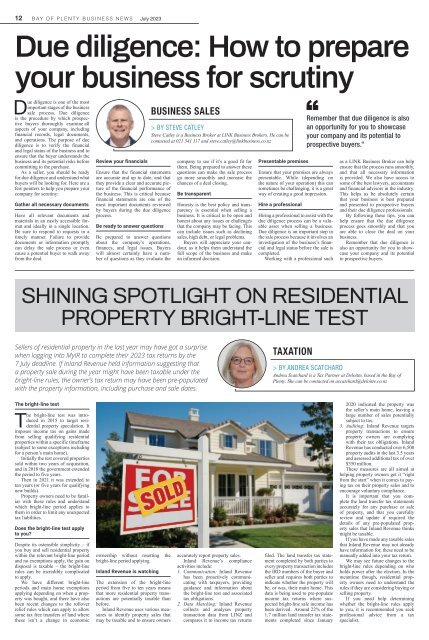July 2023 - Bay of Plenty Business News
From mid-2016 Bay of Plenty businesses have a new voice, Bay of Plenty Business News. This publication reflects the region’s growth and importance as part of the wider central North Island economy.
From mid-2016 Bay of Plenty businesses have a new voice, Bay of Plenty Business News. This publication reflects the region’s growth and importance as part of the wider central North Island economy.
You also want an ePaper? Increase the reach of your titles
YUMPU automatically turns print PDFs into web optimized ePapers that Google loves.
12 BAY OF PLENTY BUSINESS NEWS <strong>July</strong> <strong>2023</strong><br />
Due diligence: How to prepare<br />
your business for scrutiny<br />
Due diligence is one <strong>of</strong> the most<br />
important stages <strong>of</strong> the business<br />
sale process. Due diligence<br />
is the procedure by which prospective<br />
buyers thoroughly examine all<br />
aspects <strong>of</strong> your company, including<br />
financial records, legal documents,<br />
and operations. The purpose <strong>of</strong> due<br />
diligence is to verify the financial<br />
and legal status <strong>of</strong> the business and to<br />
ensure that the buyer understands the<br />
business and its potential risks before<br />
committing to the purchase.<br />
As a seller, you should be ready<br />
for due diligence and understand what<br />
buyers will be looking for. Here are a<br />
few pointers to help you prepare your<br />
company for scrutiny:<br />
Gather all necessary documents<br />
Have all relevant documents and<br />
materials in an easily accessible format<br />
and ideally in a single location.<br />
Be sure to respond to requests in a<br />
timely manner. Failure to provide<br />
documents or information promptly<br />
can delay the sale process or even<br />
cause a potential buyer to walk away<br />
from the deal.<br />
Review your financials<br />
Ensure that the financial statements<br />
are accurate and up to date, and that<br />
they provide a clear and accurate picture<br />
<strong>of</strong> the financial performance <strong>of</strong><br />
the business. This is critical because<br />
financial statements are one <strong>of</strong> the<br />
most important documents reviewed<br />
by buyers during the due diligence<br />
process.<br />
Be ready to answer questions<br />
Be prepared to answer questions<br />
about the company’s operations,<br />
finances, and legal issues. Buyers<br />
will almost certainly have a number<br />
<strong>of</strong> questions as they evaluate the<br />
BUSINESS SALES<br />
> BY STEVE CATLEY<br />
Steve Catley is a <strong>Business</strong> Broker at LINK <strong>Business</strong> Brokers. He can be<br />
contacted at 021 341 117 and steve.catley@linkbusiness.co.nz<br />
company to see if it’s a good fit for<br />
them. Being prepared to answer these<br />
questions can make the sale process<br />
go more smoothly and increase the<br />
chances <strong>of</strong> a deal closing.<br />
Be transparent<br />
Honesty is the best policy and transparency<br />
is essential when selling a<br />
business. It is critical to be open and<br />
honest about any issues or challenges<br />
that the company may be facing. This<br />
can include issues such as declining<br />
sales, high debt, or legal problems.<br />
Buyers will appreciate your candour,<br />
as it helps them understand the<br />
full scope <strong>of</strong> the business and make<br />
an informed decision.<br />
Presentable premises<br />
Ensure that your premises are always<br />
presentable. While (depending on<br />
the nature <strong>of</strong> your operation) this can<br />
sometimes be challenging, it is a great<br />
way <strong>of</strong> creating a good impression.<br />
Hire a pr<strong>of</strong>essional<br />
Hiring a pr<strong>of</strong>essional to assist with the<br />
due diligence process can be a valuable<br />
asset when selling a business.<br />
Due diligence is an important step in<br />
the sale process because it involves an<br />
investigation <strong>of</strong> the business’s financial<br />
and legal status before the sale is<br />
completed.<br />
Working with a pr<strong>of</strong>essional such<br />
Remember that due diligence is also<br />
an opportunity for you to showcase<br />
your company and its potential to<br />
prospective buyers.”<br />
as a LINK <strong>Business</strong> Broker can help<br />
ensure that the process runs smoothly,<br />
and that all necessary information<br />
is provided. We also have access to<br />
some <strong>of</strong> the best lawyers, accountants<br />
and financial advisors in the industry.<br />
This helps us be absolutely certain<br />
that your business is best prepared<br />
and presented to prospective buyers<br />
and their due diligence pr<strong>of</strong>essionals.<br />
By following these tips, you can<br />
help ensure that the due diligence<br />
process goes smoothly and that you<br />
are able to close the deal on your<br />
business.<br />
Remember that due diligence is<br />
also an opportunity for you to showcase<br />
your company and its potential<br />
to prospective buyers.<br />
SHINING SPOTLIGHT ON RESIDENTIAL<br />
PROPERTY BRIGHT-LINE TEST<br />
Sellers <strong>of</strong> residential property in the last year may have got a surprise<br />
when logging into MyIR to complete their <strong>2023</strong> tax returns by the<br />
7 <strong>July</strong> deadline. If Inland Revenue held information suggesting that<br />
a property sale during the year might have been taxable under the<br />
bright-line rules, the owner’s tax return may have been pre-populated<br />
with the property information, including purchase and sale dates.<br />
TAXATION<br />
> BY ANDREA SCATCHARD<br />
Andrea Scatchard is a Tax Partner at Deloitte, based in the <strong>Bay</strong> <strong>of</strong><br />
<strong>Plenty</strong>. She can be contacted on ascatchard@deloitte.co.nz<br />
The bright-line test<br />
The bright-line test was introduced<br />
in 2015 to target residential<br />
property speculation. It<br />
imposes income tax on gains made<br />
from selling qualifying residential<br />
properties within a specific timeframe<br />
(subject to some exceptions including<br />
for a person’s main home).<br />
Initially the test covered properties<br />
sold within two years <strong>of</strong> acquisition,<br />
and in 2018 the government extended<br />
the period to five years.<br />
Then in 2021 it was extended to<br />
ten years (or five years for qualifying<br />
new builds).<br />
Property owners need to be familiar<br />
with these rules and understand<br />
which bright-line period applies to<br />
them in order to limit any unexpected<br />
tax liabilities.<br />
Does the bright-line test apply<br />
to you?<br />
Despite its ostensible simplicity – if<br />
you buy and sell residential property<br />
within the relevant bright-line period<br />
and no exemptions apply, the gain on<br />
disposal is taxable – the bright-line<br />
rules can be incredibly complicated<br />
to apply.<br />
We have different bright-line<br />
periods and main home exemptions<br />
applying depending on when a property<br />
was bought, and there have also<br />
been recent changes to the rollover<br />
relief rules which can apply to allow<br />
some tax free transfers <strong>of</strong> land where<br />
these isn’t a change in economic<br />
ownership without resetting the<br />
bright-line period applying.<br />
Inland Revenue is watching<br />
The extension <strong>of</strong> the bright-line<br />
period from five to ten years means<br />
that more residential property transactions<br />
are potentially taxable than<br />
before.<br />
Inland Revenue uses various measures<br />
to identify property sales that<br />
may be taxable and to ensure owners<br />
accurately report property sales.<br />
Inland Revenue’s compliance<br />
activities include:<br />
1. Communication: Inland Revenue<br />
has been proactively communicating<br />
with taxpayers, providing<br />
guidance and information about<br />
the bright-line test and associated<br />
tax obligations.<br />
2. Data Matching: Inland Revenue<br />
collects and analyses property<br />
transaction data from LINZ and<br />
compares it to income tax returns<br />
filed. The land transfer tax statement<br />
completed by both parties to<br />
every property transaction includes<br />
the IRD numbers <strong>of</strong> the buyer and<br />
seller and requires both parties to<br />
indicate whether the property will<br />
be, or was, their main home. This<br />
data is being used to pre-populate<br />
income tax returns where suspected<br />
bright-line sale income has<br />
been derived. Around 22% <strong>of</strong> the<br />
1.7 million land transfer tax statements<br />
completed since January<br />
2020 indicated the property was<br />
the seller’s main home, leaving a<br />
large number <strong>of</strong> sales potentially<br />
subject to tax.<br />
3. Auditing: Inland Revenue targets<br />
property transactions to ensure<br />
property owners are complying<br />
with their tax obligations. Inland<br />
Revenue has conducted over 6,500<br />
property audits in the last 3.5 years<br />
and assessed additional tax <strong>of</strong> over<br />
$350 million.<br />
These measures are all aimed at<br />
helping property owners get it “right<br />
from the start” when it comes to paying<br />
tax on their property sales and to<br />
encourage voluntary compliance.<br />
It is important that you complete<br />
the land transfer tax statements<br />
accurately for any purchase or sale<br />
<strong>of</strong> property, and that you carefully<br />
review and update if required the<br />
details <strong>of</strong> any pre-populated property<br />
sales that Inland Revenue thinks<br />
might be taxable.<br />
If you have made any taxable sales<br />
that Inland Revenue may not already<br />
have information for, these need to be<br />
manually added into your tax return.<br />
We may see future changes to the<br />
bright-line rules depending on who<br />
holds power after the election. In the<br />
meantime though, residential property<br />
owners need to understand the<br />
rules if they are considering buying or<br />
selling property.<br />
If you need help determining<br />
whether the bright-line rules apply<br />
to you, it is recommended you seek<br />
pr<strong>of</strong>essional advice from a tax<br />
specialist.
















